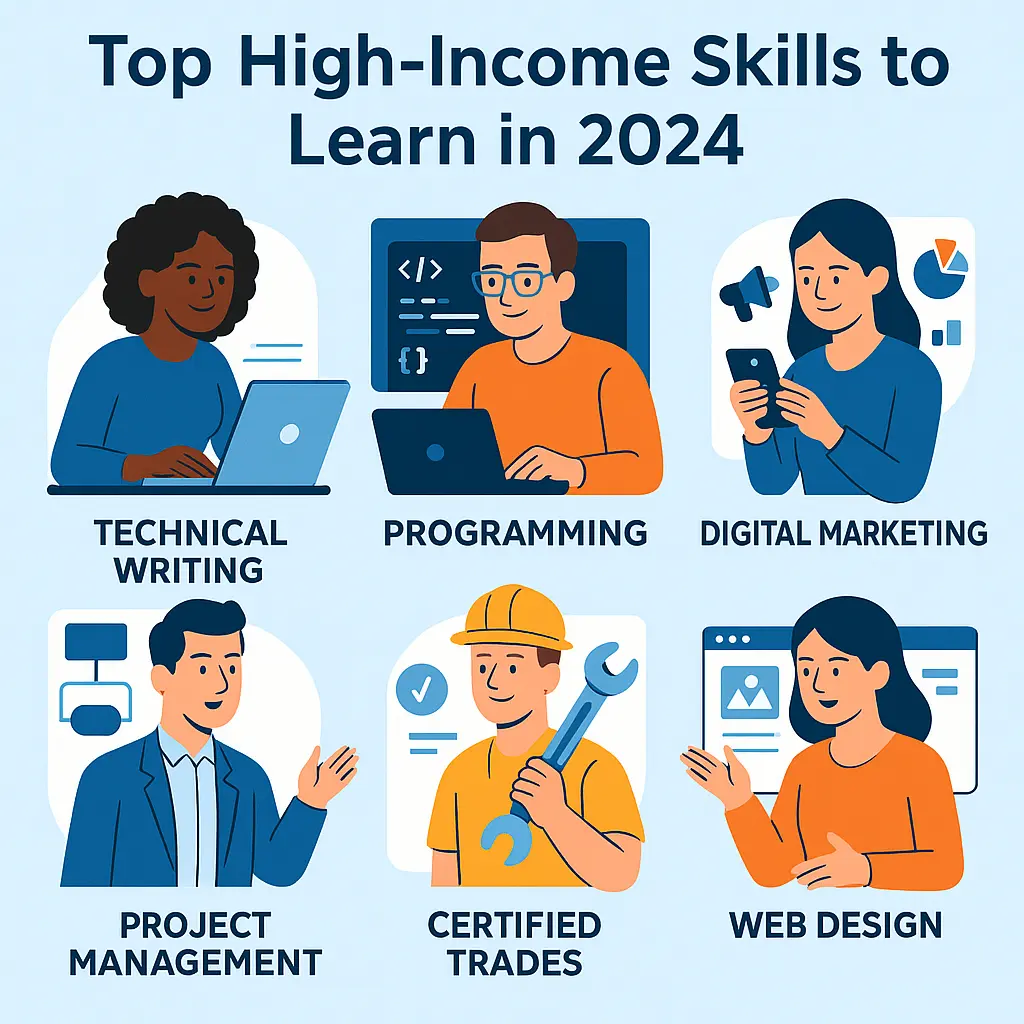Top High-Income Skills to Learn in 2025

Degrees still matter, but skills decide pay. Employers care about what you can deliver this quarter, not just what you studied years ago. Below are high-income, skill-first paths you can start learning today—with clear steps, time-to-proficiency estimates, and ways to monetize as you go. Choose one, build a small portfolio, and let outcomes (not buzzwords) speak for you.
How to Choose the Right Skill
Pick a skill that intersects three things: market demand, your curiosity, and evidence of progress you can show (projects, metrics, testimonials). If a skill excites you, you will practice more and stick through plateaus. If a market pays for it, you’ll find clients or roles. If you can demonstrate results, you’ll stand out—fast.
1) Programming & Automation
Software isn’t slowing down. Small, targeted projects can command great rates because they remove repetitive work or enable growth.
- Start with: Python or JavaScript; build 3–5 tiny tools (data cleaner, report generator, site scrapers).
- Time to first wins: 6–10 weeks (1–2 hours/day) to ship basic, useful scripts.
- Portfolio ideas: automate a weekly CSV → dashboard workflow; build a simple API; publish a GitHub repo with docs.
- Monetize: freelance on automation gigs, offer “SOP + script” packages to small businesses, apply for junior dev/ops roles.
2) Digital Marketing (Performance-Focused)
Companies pay for measurable results: leads, sales, lower CPA. Master one acquisition channel, then add conversion rate optimization (CRO).
- Start with: Meta or Google Ads + landing page basics + analytics (UTM, goals).
- Time to first wins: 4–8 weeks to manage small budgets responsibly.
- Portfolio ideas: case study landing page with before/after CPA or ROAS; A/B test summary; GA4 screenshots.
- Monetize: retainers for small businesses, performance-based fees, in-house roles.
3) Technical Writing & Documentation
Clear documentation reduces support costs and accelerates adoption. If you can translate complex features into plain English, you’re valuable.
- Start with: choose a dev tool or SaaS you use; rewrite two pages of docs with examples and diagrams.
- Time to first wins: 3–6 weeks to build a sample library and style guide.
- Portfolio ideas: “Quickstart” guides, API walkthroughs, migration checklists, before/after edits with clarity metrics.
- Monetize: freelance for startups, technical content roles, internal knowledge base projects.
4) Data Analytics for Business Decisions
Many teams drown in data but lack answers. If you can frame questions, clean data, and produce a clear chart with a recommendation, you win.
- Start with: SQL + spreadsheets + a BI tool (Looker Studio/Power BI).
- Time to first wins: 6–8 weeks to deliver weekly KPI dashboards.
- Portfolio ideas: build a sales funnel dashboard, cohort retention chart, or CAC vs. LTV report with commentary.
- Monetize: fractional analyst retainers, analytics roles, ops positions.
5) Product & Project Management
Execution is a skill. Good PMs align goals, coordinate teams, and ship value on time.
- Start with: agile basics, user stories, roadmaps, and metrics (NPS, activation, retention).
- Time to first wins: 6–10 weeks leading a small project end-to-end.
- Portfolio ideas: write a PRD, roadmap slide, and retrospective; include screenshots and outcomes.
- Monetize: PM/PO roles, delivery management, consulting for startups.
6) Sales & Consulting (High-Trust, High-Ticket)
Closing complex deals demands research, listening, and tailored proposals. If you enjoy conversations and problem-solving, this path scales quickly.
- Start with: outbound frameworks (cold email, discovery calls), proposal writing, objection handling.
- Time to first wins: 4–6 weeks to book meetings; 8–12 weeks to close predictable deals.
- Portfolio ideas: anonymized case studies: problem → solution → ROI; email sequences with reply rates.
- Monetize: commission roles, retainers with performance bonuses, independent consulting.
How to Learn Fast (Without Burning Out)
- Define a 30–60 day project: one concrete outcome (e.g., a working app, a dashboard, a case study).
- Deliberate practice: 60–90 minutes daily, timed, with immediate feedback (mentor, forum, analytics).
- Ship weekly: publish progress posts or demos; accountability accelerates learning.
- Collect proof: screenshots, metrics, testimonials—turn practice into portfolio.
Where to Learn (Free & Paid)
- Free: official docs, YouTube deep dives, community forums, open-source repos.
- Paid: focused courses, bootcamps with projects, mentorship programs.
- Books: pick one “classic” per skill to internalize fundamentals.
For a curated list of free finance and career resources, see Best Free Resources to Learn About Money.
Monetization Paths (Beginner → Pro)
| Stage | What to Ship | How to Earn |
|---|---|---|
| Weeks 1–4 | Mini projects, public notes, small demos | Entry gigs, internships, portfolio building |
| Weeks 5–10 | Case studies with metrics | Freelance, contract roles, junior positions |
| Months 3–6 | Repeatable systems, templates, playbooks | Premium retainers, productized services |
Interlink Your Growth
As your skills expand, pair learning with better money habits. Build a budget that supports course fees and time to practice—see How to Create a Personal Budget That Actually Works. Update your resume to match the new skill set—use How to Write a Resume That Gets You Hired. And translate your progress into long-term planning with Smart Career Planning.
FAQ
Which high-income skill is fastest to monetize?
Digital marketing and sales often produce quicker wins because small businesses feel the ROI immediately. Automation scripts can also land early freelance gigs.
Do I need a degree?
No. Employers and clients primarily want proof: portfolios, metrics, references, and clear communication.
How do I avoid overwhelm?
Pick one skill, one project, and a 30–60 day window. Ignore everything else until you finish and publish.
What if I’m mid-career?
Leverage domain knowledge. Combine your industry insight with a new capability (e.g., analytics + healthcare) to differentiate instantly.
Bottom Line
High-income skills compound. Choose one, practice deliberately, and ship small wins weekly. Document your results, fold them into your resume, and pursue roles or clients where outcomes matter. For next steps, learn to present those outcomes effectively in your resume and align them with a long-term plan in career planning.